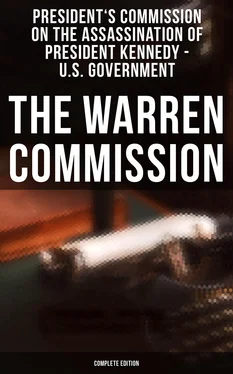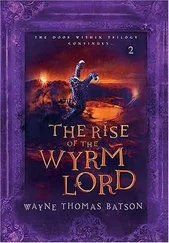Mr. Rankin. Before the assassination, did you ever see your husband examining the route of the parade as it was published in the paper?
Mrs. Oswald. No.
Mr. Rankin. Did you ever see him looking at a map of Dallas like he did in connection with the Walker shooting?
Mrs. Oswald. No.
Mr. Rankin. How did you learn of the shooting of President Kennedy?
Mrs. Oswald. I was watching television, and Ruth by that time was already with me, and she said someone had shot at the President.
Mr. Rankin. What did you say?
Mrs. Oswald. It was hard for me to say anything. We both turned pale. I went to my room and cried.
Mr. Rankin. Did you think immediately that your husband might have been involved?
Mrs. Oswald. No.
Mr. Rankin. Did Mrs. Paine say anything about the possibility of your husband being involved?
Mrs. Oswald. No, but she only said that "By the way, they fired from the building in which Lee is working."
My heart dropped. I then went to the garage to see whether the rifle was there, and I saw that the blanket was still there, and I said, "Thank God." I thought, "Can there really be such a stupid man in the world that could do something like that?" But I was already rather upset at that time—I don't know why. Perhaps my intuition.
I didn't know what I was doing.
Mr. Rankin. Did you look in the blanket to see if the rifle was there?
Mrs. Oswald. I didn't unroll the blanket. It was in its usual position, and it appeared to have something inside.
Mr. Rankin. Did you at any time open the blanket to see if the rifle was there?
Mrs. Oswald. No, only once.
Mr. Rankin. You have told us about that.
Mrs. Oswald. Yes.
Mr. Rankin. And what about Mrs. Paine? Did she look in the blanket to see if the rifle was there?
Mrs. Oswald. She didn't know about the rifle.
Perhaps she did know. But she never told me about it.
I don't know.
Mr. Rankin. When did you learn that the rifle was not in the blanket?
Mrs. Oswald. When the police arrived and asked whether my husband had a rifle, and I said "Yes."
Mr. Rankin. Then what happened?
Mrs. Oswald. They began to search the apartment. When they came to the garage and took the blanket, I thought, "Well, now, they will find it."
They opened the blanket but there was no rifle there.
Then, of course, I already knew that it was Lee. Because, before that, while I thought that the rifle was at home, I did not think that Lee had done that. I thought the police had simply come because he was always under suspicion.
Mr. Rankin. What do you mean by that—he was always under suspicion?
Mrs. Oswald. Well, the FBI would visit us.
Mr. Rankin. Did they indicate what they suspected him of?
Mrs. Oswald. They didn't tell me anything.
Mr. Rankin. What did you say to the police when they came?
Mrs. Oswald. I don't remember now. I was so upset that I don't remember what I said.
Mr. Rankin. Did you tell them about your husband leaving his wedding ring that morning?
Mrs. Oswald. No, because I didn't know it.
Mr. Rankin. Did you tell them that you had looked for the gun you thought was in the blanket?
Mrs. Oswald. No, it seems to me I didn't say that. They didn't ask me.
Mr. Rankin. Did you watch the police open the blanket to see if the rifle was there?
Mrs. Oswald. Yes.
Mr. Rankin. Did Mrs. Paine also watch them?
Mrs. Oswald. It seems to me, as far as I remember.
Mr. Rankin. When the police came, did Mrs. Paine act as an interpreter for you?
Mrs. Oswald. Yes. She told me about what they had said. But I was not being questioned so that she would interpret. She told me herself. She very much loved to talk and she welcomed the occasion.
Mr. Rankin. You mean by that that she answered questions of the police and then told you what she had said?
Mrs. Oswald. Yes.
Mr. Rankin. And what did she tell you that she had said to the police?
Mrs. Oswald. She talked to them in the usual manner, in English, when they were addressing her.
But when they addressed me, she was interpreting.
Mr. Rankin. Do you recall the exact time of the day that you discovered the wedding ring there at the house?
Mrs. Oswald. About 2 o'clock, I think. I don't remember. Then everything got mixed up, all time.
Mr. Rankin. Did the police spend considerable time there?
Mrs. Oswald. Yes.
Mr. Rankin. Do you remember the names of any of the officers?
Mrs. Oswald. No, I don't.
Mr. Rankin. How did they treat you?
Mrs. Oswald. Rather gruff, not very polite. They kept on following me. I wanted to change clothes because I was dressed in a manner fitting to the house. And they would not even let me go into the dressing room to change.
Mr. Rankin. What did you say about that?
Mrs. Oswald. Well, what could I tell them?
I asked them, but they didn't want to. They were rather rough. They kept on saying, hurry up.
Mr. Rankin. Did they want you to go with them?
Mrs. Oswald. Yes.
Mr. Rankin. Did you leave the house with them right soon after they came?
Mrs. Oswald. About an hour, I think.
Mr. Rankin. And what were they doing during that hour?
Mrs. Oswald. They searched the entire house.
Mr. Rankin. Did they take anything with them?
Mrs. Oswald. Yes—everything, even some tapes—Ruth's tapes from a tape recorder, her things. I don't know what.
Mr. Rankin. Did they take many of your belongings?
Mrs. Oswald. I didn't watch at that time. After all, it is not my business. If they need it, let them take it.
Mr. Rankin. Did they give you an inventory of what they took?
Mrs. Oswald. No.
Mr. Rankin. You have never received an inventory?
Mrs. Oswald. No.
Mr. Rankin. Do you now know what they took?
Mrs. Oswald. No. I know that I am missing my documents, that I am missing Lee's documents, Lee's wedding ring.
Mr. Rankin. What about clothing?
Mrs. Oswald. Robert had some of Lee's clothing. I don't know what was left of Lee's things, but I hope they will return it. No one needs it.
Mr. Rankin. What documents do you refer to that you are missing?
Mrs. Oswald. My foreign passport, my immigration card, my birth certificate, my wedding certificate—marriage certificate, June's and Rachel's birth certificates. Then various letters, my letters from friends. Perhaps something that has some bearing—photographs, whatever has some reference—whatever refers to the business at hand, let it remain.
Then my diploma. I don't remember everything now.
Mr. Rankin. What documents of your husband's do you recall that they took?
Mrs. Oswald. I didn't see what they took. At least at the present time I have none of Lee's documents.
Mr. Rankin. The documents of his that you refer to that you don't have are similar to your own that you described?
Mrs. Oswald. Yes. He also had a passport, several work books, labor cards. I don't know what men here—what sort of documents men here carry.
Mr. Rankin. Mr. Chairman, it is now 12:30.
The Chairman. I think we will recess now for lunch.
(Whereupon, at 12:30 p.m., the Commission recessed.)
Afternoon Session
TESTIMONY OF MRS. LEE HARVEY OSWALD RESUMED
Table of Contents
The President's Commission reconvened at 2 p.m.
The Chairman. The Commission will be in order. Mr. Rankin, you may continue.
Mr. Rankin. Mrs. Oswald, we will hand you Exhibit 19, which purports to be an envelope from the Soviet Embassy at Washington, dated November 4, 1963, and ask you if you recall seeing the original or a copy of that.
Mrs. Oswald. I had not seen this envelope before, but Lee had told me that a letter had been received in my name from the Soviet Embassy with congratulations on the October Revolution—on the date of the October Revolution.
Читать дальше












